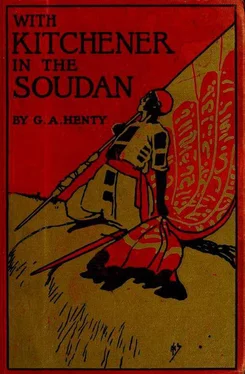"The two men seemed much pleased. It was evident to them that if they could do these things it would widely add to their reputation, 'It is good,' they said; 'you shall go round with us and see the wounded, and we will see for ourselves what you can do. Will you want this chest carried?'
"'No,' I said; 'I will take these instruments with me. Should it be necessary to cut off a limb to try and save life, I shall need the knives, the saw, and this instrument, which I heard the white hakim call a tourniquet, and which they use for stopping the flow of blood while they are cutting. There are other instruments, too, that will be required.'
CHAPTER XVIII
A HAKIM
I SUCCEEDED in getting out two more bullets, and then handed the instruments to the hakims, saying that I had shown them all I knew, and would now leave the matter in their hands altogether, or would act as their assistant if they wished it. I had no fear that harm would come of it, for being so frequently engaged in war I knew that they had in a rough way considerable skill in the treatment of wounds. I had impressed upon them while probing the wounds that no force must be used, and that the sole object was to find the exact course the ball had taken. As to the amputations, they would probably not be attempted. A fighting Dervish would rather die than lose a limb, and were he to die under an operation his relatives would accuse the operator of having killed him.
" I remained at work with them for two or three days. In nearly half the cases they failed to find the course of the ball; but when they did so and the wound was not too deep, they generally succeeded in extracting it. They were highly pleased, and I took great pains to remain well in the background.
"They were very friendly with me; their fees were mostly horses, or carpets, or other articles, in accordance with the means of the patients, and of these they gave me a portion, together with some money which had been looted from the chests carrying silver for the purchase of provisions and the payment of troops. Although they made a pretence of begging me to remain always with them, I refused, saying that I saw I could no longer be of assistance to them. I could see they were inwardly pleased. They gave me some more money, and I left them, saying that I did not for a moment suppose that I could tell them anything further, but that if at any time they should send for me I would try and recall what I had seen the white hakims do in such a case as they were dealing with.
" In the meantime Saleh was progressing very favourably, and indeed would have been up and about had I not peremptorily ordered him to remain quiet.You are doing well,' I said; 'why should you risk bringing on inflammation merely for the sake of getting about a few days earlier?'
"Abdullah was also better but still extremely weak, and I had to order that meat should be boiled for some hours, and that he should drink small quantities of the broth three or four times a day. Many times a day women came to me to ask me to see to their husbands' wounds, and sometimes the wounded men came to me themselves. All the serious cases I referred to the hakims, and confined myself simply to dressing and bandaging wounds which had grown angry for want of attention. I always refused to accept fees, insisting that I was not a hakim, and simply afforded my help as a friend. I had the satisfaction, however, of doing a great deal of good, for in the medicine-chest I found a large supply of plaster and bandages. Frequently mothers brought children to me. These I could have treated with some of the simple drugs in the chest ; but I refused to do so, for I could not have explained in an}^ satisfactory way how I knew one drug from another, or was acquainted with their qualities. Still, although I refused fees I had many little presents of fowls, fruit, pumpkins, and other things. These prevented my feeling that I was a burden upon Saleh, for of course I put them into the general stock.
" So far, I cannot but look back with deep gratitude for the strange manner in which I have been enabled to avert all suspicion, and even to make myself quite a popular character among the people of El Obeid. One bottle I found in the medicine-chest was a great prize to me. It contained iodine, and with a weak solution of this I was able to maintain my colour. I did not care so much for my face and hands, for I was so darkened by the sun that my complexion was little fairer than that of many of the Arabs. But I feared that an accidental display of a portion of my body usually covered by my garments would at once prove that I was a white man. I had used up the stuff that I had brought with me when I escaped from the square, and having no means of procuring fresh stain, was getting uneasy, but this discovery of the iodine put it within my power to renew my colouring whenever it was necessary.
"About a month later.
" I have been living here quietly since I last wrote in this journal. The day after I had done so the Emir sent for me and said he had heard that I had taken bullets out of wounds, and had shown the two doctors of the town how to do so by means of instruments found in a chest that was among the loot brought in from the battle-field. I repeated my story to him, as to how I had acquired the knowledge from being in the service of a white hakim from Cairo who was travelling in the desert, and that I had no other medical knowledge except that I had seen in the chest a bottle which contained stuff like that the white doctors used in order to put a patient to sleep, so that they could take off a limb without his feeling pain.
"I have heard of such things being done by the Turkish hakims at Khartoum, but I did not believe them. It is against all reason.'
"I have seen it done, my lord,' I said.I do not say that I could take off a limb as they did, but I am sure that the stuff would put anyone to sleep.'
"I wish you to put it to the trial,' the Emir said.One of my sons came back from the battle with a bullet-hole through his hand. The hakim said that two of the bones were broken. He put bandages round, and my son said no more about it. He is a man who does not complain of slight troubles, but yesterday evening the pain became so great that he was forced to mention it, and when I examined his arm I found that it was greatly swelled. Slaves have been bathing it with cold water ever since, but the pain has increased rather than diminished.'
"' I will look at it, my lord, but I greatly fear that it is beyond my poor skill to deal with it.'
" The young man was brought in, and on removing the bandage I saw that the wound was in a terrible state and the arm greatly inflamed some distance up the wrist. It was a bad case, and it seemed to me that unless something was done mortification would speedily set in.
"The two doctors saw it an hour ago,' the Emir went on, 'and they greatly fear for his life. They told me that they could do nothing, but that as you had seen the white hakim do wonderful things you might be able to do something.'
"My lord,' I said, 'it is one thing to watch an operation, but quite another to perform it yourself. I think, as the doctors have told you, your son's life is in great danger, and I do believe that if there were white doctors here to take off his arm he might be saved, but I could not undertake it. The skill to do so is only acquired by long years of study. How can I, a poor man, know how to do such things'? Were I to attempt and fail, what would you say?—that I had killed your son, and that but for me he might have recovered.'
"'He will not recover,' the Emir said moodily. 'What say you, Abu? You have heard what this man says; what do you think?'
"I think, Father, that it were well to try. This man has used his eyes so well that he has taken the white man's instruments and drawn out bullets from wounds. I feel as if this wound will kill me; therefore, if the man fails I shall be none the worse. Indeed, it would be better to die at once than to feel this fire burning till it burns me up.'
Читать дальше












